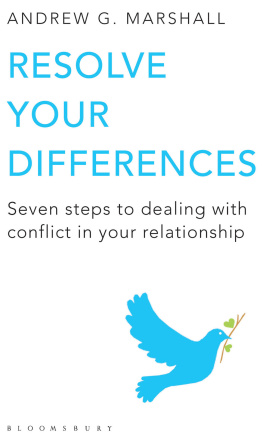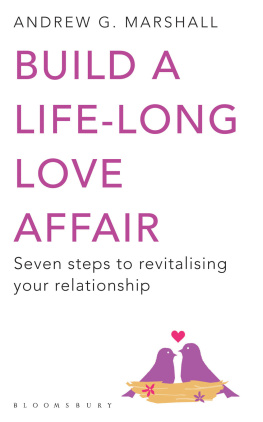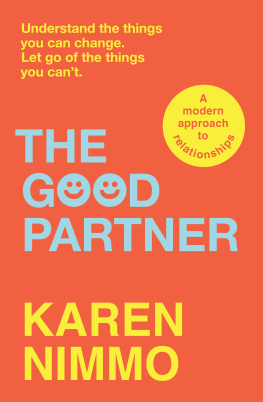Andrew G. Marshall is a marital therapist and the author of I Love You But Im Not In Love With You: Seven Steps to Saving Your Relationship , The Single Trap: The Two-step Guide to Escaping It and Finding Lasting Love and How Can I Ever Trust You Again?: Infidelity: From Discovery to Recovery in Seven Steps . He writes for The Times , the Mail on Sunday , the Guardian , Psychologies and womens magazines around the world. His work has been translated into over fifteen languages. Andrew trained with RELATE and has a private practice offering counselling, workshops, training days and inspirational talks.
www.andrewgmarshall.com
1. Stop What Doesnt Work
We are more likely to be influenced by people whom we like. So creating a contented atmosphere will make you that little bit more persuasive.
- Look at the ways you currently try and get your own way: are they working or do they just get your partners back up?
- Lower the temperature by stopping failed strategies such as lecturing, sarcasm, demanding, nagging and inducing guilt. Even milder strategies for example, placating and dropping hints can annoy your partner and make him or her irritable or sarcastic.
- Check that your request is fair.
Checkpoint: Stop communicating all the negatives and start thinking about the positives. What one small thing did you appreciate about your partner today? It might be getting up in the middle of the night to find the cough medicine, buying that really good cut of meat or just phoning to say hello. Make the commitment to communicate one positive every day; you could text or email it or maybe just tell your partner.
2. Do Less
Change is frightening and sets up our fight or flight response.
- If your partner strongly disagrees with your suggestion, he or she will be too busy fighting it to truly listen.
- If your partner flees and buries him- or herself in some all-consuming task, he or she is not listening either.
- No attention = No communication = No result.
- Therefore, instead of going for big changes, ask small questions, solve small problems and make small incremental changes to your relationship.
- Little changes not only build to have a big effect, but also one success breeds another. So although there is a slow start, improvements come faster and faster.
Checkpoint: Ask your friends: What one small thing does your partner do that makes you happy? Every time they give you something concrete he sends a postcard even if hes only away for one night write it down and use it for inspiration for small changes in your own relationship.
3. Think Smarter
Seemingly insignificant details can have a major impact on our behaviour. At first sight, the idea that everything matters might seem paralysing, but it is also empowering.
- We can easily get stuck in a rut where we automatically do the same things.
- A small push in the right direction, a nudge, can break this inertia and set up good habits.
- Nudges work best for situations that happen frequently, especially where previously there has been little or no discussion about how to divide tasks and when short-term benefits (like sitting down and having a drink) outweigh long-term ones (like doing the ironing and having a clean shirt for the morning).
- It counts as a nudge only when your partner is still free to choose.
Checkpoint: Picture what you want in detail. Instead of general unfocused goals like to be happy or get on, flesh out the details. Imagine that you could climb into a time machine and go forward three months. By this point, you will have digested all the thoughts in this book and begun to transfer them into your everyday life. Look around this near future: What sort of things would the two of you be doing? How would life be different? Imagine that you could step off the time machine and wander around your new life. How do the two of you relate to each other? Finally, coming back to today: What specific goals would you like to set?
4. Carrots Rather Than Sticks
Although it requires two people to change a relationship, one partner can always take the lead.
- You need five positives to outweigh one negative.
- So why not experiment with focusing entirely on the positive?
- Discuss what works in your relationship and what resources you can use to improve your relationship.
- Being positive will make it easier to recruit your partner and gain his or her cooperation.
Checkpoint: When youre considering asking your partner a question, in order to move your relationship forward, give it the genuine test. By this I mean is it an open question (how, what, which) and not pointing towards your preferred option? The best-framed questions are ones to which you genuinely dont know the answer but want your partners help to figure it out. For example: What should we do with our retirement? or How do we keep our love life fresh?
5. Change Your Behaviour
When a relationship needs improving, it is much easier to complain about our partners contribution to the problems than to look at our own.
- How has your behaviour contributed to the problem? What could you learn from your partner? How could you become more of a team? Answering these questions will help you move towards the middle of an issue and become more balanced.
- Knowing which part of your personality is in play Parent, Adult or Child and how that affects the response of your partner is key to improving communication.
- People are OK. Learning to like yourself and remembering your partners good qualities can transform your relationship.
- Understand the link between your interpretation of events and your feelings, and question any negative automatic thoughts, assumptions and beliefs.
Checkpoint: In a successful relationship, partners not only look after each other but also themselves. Unfortunately, some people focus all their care on their partner hoping he or she will return the favour. In the meantime, they become emotionally exhausted and either sacrifice their needs (and become a people-pleaser) or become resentful (and become a serial complainer). So what have you done lately to nurture yourself? What would you like to do? How could your partner help facilitate this activity perhaps by looking after your children?
6. Coming Back From Crisis Point
You have to believe that your relationship will work and act lovingly towards your partner.
- Dont be panicked into short-term coping mechanisms that actually make the relationship worse.
- Acknowledge the issues, take your share of the responsibility and listen truly listen to your partner.
- Once problems are out in the open, they can finally be addressed.
- Slow and steady progress, underpinned by patience and tenacity, will save the day.
Checkpoint: When we are stressed, we find it hard to take in what our partner is saying. Even under the best circumstances, we take in only 46 per cent of what were told and therefore need to have it repeated. So follow this golden rule for communicating something important: say it and then repeat what you have said.
7. No Turning Back
If you keep on doing what youve always done, youll keep on getting the same results, so make a commitment to change.
- Create good habits rather than making a special effort.
- Accepting your partners foibles and failings as facts of life rather than problems to be solved will allow your partner to make an important internal shift.
- Once your partner does not feel judged, he or she can look at their behaviour through new eyes and be open to change.
- Cynicism is one of the greatest threats to relationships today. When your friends or work colleagues bond by moaning about their partners failings, dont join in. These discussions just pump up our dissatisfaction and unhappiness.
Next page










